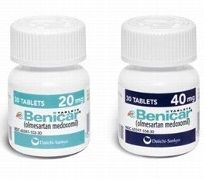Top Class Actions’s website and social media posts use affiliate links. If you make a purchase using such links, we may receive a commission, but it will not result in any additional charges to you. Please review our Affiliate Link Disclosure for more information.

Texas plaintiff George Williams recently just realized his GI experiences could be tied to Benicar. Used to lower blood pressure, it could be months to years before symptoms show from Benicar usage. In his Benicar side effects lawsuit, Williams alleges that while on Benicar he “suffered chronic diarrhea, dehydration, weight loss, nausea, vomiting and malnutrition.” Over the last four years, Williams says he was hospitalized more than 10 times, spending a total of more than 100 days being examined, and misdiagnosed, by doctors.
Since doctors were not aware of the link between Benicar and GI issues, Williams was treated for a “mystery ailment.” He was given steroids, and claims in his Benicar side effects lawsuit that the side effects of the treatment caused cataracts. Moreover, he alleges the treatments he underwent caused him to suffer a back fracture and permanent intestinal damage that now requires him to use a feeding tube.
Williams’ Benicar lawsuit says that the manufacturers failed to conduct sufficient testing in clinical trials. He also says that the companies knew, or should have known, of the gastrointestinal risks connected to the medication, but didn’t inform the public.
Williams is are suing Daiichi Sankyo and Forest Laboratories for defective design, failure to warn, strict liability, gross negligence, negligence per se, negligent misrepresentation, fraudulent concealment, constructive fraud, fraud, violation of consumer protection laws, the New Jersey Consumer Fraud Act, civil conspiracy, breach of warranties, unjust enrichment, negligent infliction of emotional distress, loss of consortium and punitive damages.
The Benicar lawsuit was in the state Supreme Court, but was moved to the federal courts.
The Benicar Lawsuit is George and Martha Williams v. Daiichi Sankyo, et al., in the U.S. District Court for the District of New Jersey.
Olmesartan Enteropathy
The U.S. Food and Drug Administration (FDA) approved Benicar (olmesartan medoxomil) in 2002. Benicar belongs to a class of drugs known as angiotensin II receptor blockers (ARBs). It is approved for the treatment of high blood pressure (hypertension). By 2012, there were an estimated 10.6 million prescriptions for Benicar or Benicar HCT.
Marketed as an “ARB with superior efficacy,” the manufacturers spent millions on advertising campaigns. Williams’ Benicar lawsuit accuses Daiichi Sankyo of “overly-aggressive marketing of the drug,” and notes that in 2006, the FDA accused the company of false advertising and not including the health risks on marketing materials.
It wasn’t until 2012, after a decade on the market, that researchers at the Mayo Clinic published a study that showed cases of Benicar patients suffering intestinal problems. Their symptoms showed “sprue-like enteropathy,” a condition that results in chronic diarrhea, weight loss and permanent gastrointestinal damage. These issues are similar to celiac disease, which is why many Benicar takers are put on gluten-free diets. But the diet reportedly doesn’t help Benicar sufferers like Williams.
A year after this report came out, on July 3, 2013, the FDA issued a Drug Safety Communication regarding olmesartan medoxomil (Benicar), warning doctors about the potential intestinal problems their patients can face. It’s noted that Benicar users often see their symptoms disappear when they stop taking the medication, and reappear if Benicar is taken again.
However, even if ceasing the drug stops symptoms, many long-term Benicar patients may be left suffering villous atrophy. Villous atrophy prevents the intestine from absorbing nutrients and reduces digestive capabilities. This typically causes chronic dehydration, malnutrition, a weakened ability to fight off other illness, and electrolyte problems. Sufferers of these symptoms, learning of the connection between Benicar and their chronic diarrhea and GI problems, have been pursuing legal action.
In general, Benicar lawsuits are filed individually by each plaintiff and are not class actions.
Do YOU have a legal claim? Fill out the form on this page now for a free, immediate, and confidential case evaluation. The attorneys who work with Top Class Actions will contact you if you qualify to let you know if an individual lawsuit or class action lawsuit is best for you. Hurry — statutes of limitations may apply.
ATTORNEY ADVERTISING
Top Class Actions is a Proud Member of the American Bar Association
LEGAL INFORMATION IS NOT LEGAL ADVICE
Top Class Actions Legal Statement
©2008 – 2024 Top Class Actions® LLC
Various Trademarks held by their respective owners
This website is not intended for viewing or usage by European Union citizens.
Get Help – It’s Free
Join a Free Benicar Class Action Lawsuit Investigation
If you or a loved one used Benicar for at least four months and were hospitalized for severe gastrointestinal problems, you may have a legal claim. Submit your information now for a free case evaluation.
An attorney will contact you if you qualify to discuss the details of your potential case at no charge to you.
Oops! We could not locate your form.












